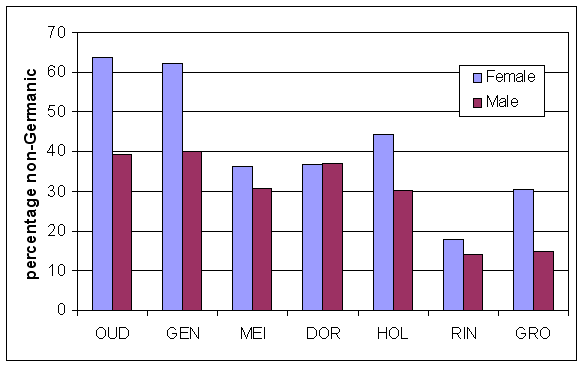Names in the Low Lands 1250-1300
High-medieval given names and bynames in The Netherlands and Flanders
Analysis 1: Germanic vs. non-Germanic names
|
During the early Middle Ages, most given names in the Low Lands were Germanic: bipartite names, consisting of a first and a second element.
Around the year 1000 this changed, and other names slowly came into use: mostly biblical, but also names from Latin, Greek or Celtic origin. However, the frequencies remained low. In the 11th century, only about 5% of all given names were non-Germanic. These percentages were higher in the south (Flanders) than in the northern Low Lands
(see Names in the Low Lands before 1150).
The present survey showed that non-Germanic names were much more common during the 13th century, especially among women. The survey also revealed striking regional differences. In the two Flemish towns, about 60% of the ladies had a non-Germanic name, but further north only about 30%, and in Rinnegom even less than 20% (still well above the early-medieval score). Schoonheim (2000) analysed gender differences in Germanic vs. non-Germanic names in one sample: the Rinnegom charter. Her conclusion was, that the difference between men and women was not statistically significant. However, in the present survey, the difference in six of the seven independent samples pointed in the same direction (male percentage of non-Germanic names lower than female percentage). In only one region women scored slightly higher. This finding is statistically significant (Wilcoxon matched-pairs signed-ranks, T = 1, N = 7, p < 0,01). Apparently, parents in the 13th century were more traditional when naming their sons. These trends are illustrated in the graph below. Apart from Germanic and non-Germanic names, there was a small number of names that could not be classified, either because their origin was unknown, or because they were a combination of a non-Germanic name with a Germanic element. Among men in Dordrecht, names of unknown origin occurred rather frequently. 
The relative frequencies of non-Germanic names in the seven locations, among women and men. |
|
Introduction References Locations Raw data (550 Kb) |
Lists: Given names women Given names men Occupational names and Nicknames |
Analyses: Non-Germanic names Variation Most popular names Bynames |
© Dr. Kees C. Nieuwenhuijsen
home page: www.keesn.nl |
